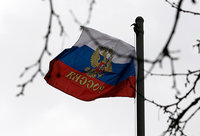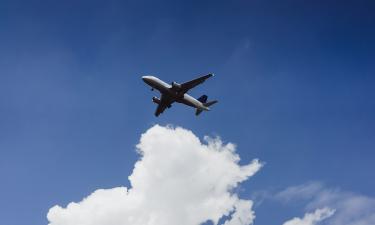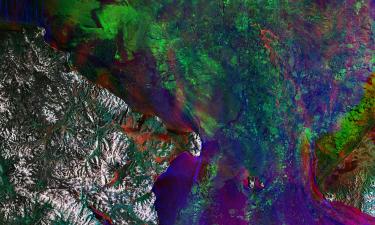Russia takes Crimea back
On Tuesday, March 18 at 15:00 Moscow time, both houses of the Federal Assembly - The State Duma and the Federation Council - gathered in St. George's Hall in the Kremlin to listen to the extraordinary address from President Vladimir Putin in connection with the appeal from the Republic of Crimea and the city of Sevastopol for accession to the Russian Federation. Deputies of the State Duma, the Federation Council, the regional leaders and representatives of the civil society gave many standing ovations to Putin's speech.

The message of the speech was clear in advance. In the morning, the president expressed his point of view on the subject as he literally "ordered" both chambers to resolve the issue with the accession of the Crimea to Russia as soon as possible. He also said that Russia and the Crimea should sign an inter-state agreement on the top level.
Duma deputies had previously adopted a draft declaration "About the situation in the Crimea," in which they expressed support for the people of Crimea in their aspiration to reunite with Russia. Tomorrow morning (March 19), the deputies are to meet with a delegation of the Crimea. At 19:00, the Speaker of the Federation Council, Valentina Matviyenko, and members of the upper chamber will have a meeting with the Crimean delegation.
In accordance with applicable law, one will only have to sign an interstate agreement to make the Crimea a part of the Russian Federation. After that, the President will appeal to the Constitutional Court of the Russian Federation with a request to assess the compliance of the agreement to the Constitution. Then, the documents will be sent to the State Duma, which intends to speed up the procedure for their adoption. Therefore, it is possible that the relevant law will be passed on March 21st.
There is no legal necessity in today's speech from the Russian president. Putin signed the decree on the recognition the Republic of Crimea as an independent state, and with his speech, he takes a chance to explain his point of view to the world. This is his "personal desire" to deliver the speech, his spokesman Dmitry Peskov said.
As Putin stated during his today's speech in the Kremlin, the relations with the brotherly Ukrainian people have always been and will always remain of paramount importance to Russia.
The referendum in the Crimea took place in full compliance with democratic procedures, the president said , recalling that the turnout at the voting made up over 82 percent. "More than 96 percent voted for the reunification with Russia. The numbers are highly compelling," Putin said.
"In order to understand why this choice was made, it is enough to know the history of the Crimea, and know what Russia means for the Crimea and what Crimea means to Russia," he said.
According to Putin, in the Crimea, everything is literally permeated with common history and pride. "There is ancient Chersonesos there, where Holy Prince Vladimir was baptized. His spiritual struggle - an appeal to Orthodoxy - predestined common cultural values and civilizational framework that will unite the peoples of Russia, Ukraine and Belarus," says the head of the Russian state. "In the Crimea, there are graves of the Russian soldiers, with whose courage the Crimea was taken into the Russian state in 1783. The Crimea is Sevastopol, a legendary city of great destiny, a fortress city and the birthplace of the Russian Black Sea Navy," said Putin.
"During all these years, many citizens and many public figures have raised this issue, saying that the Crimea is a native Russian land and that Sevastopol is a Russian city," Putin said.
Russian people are tired of the permanent crisis that has been shaking Ukraine more than 20 years, the Russian president said. "The situation began to develop differently. There were repeated attempts made to deprive the Russians of their historical memory, and sometimes their mother tongue, to make them an object of forced assimilation, - said Putin. - The Russians, as well as other citizens of Ukraine, were suffering from the constant political crisis that has been shaking the region for over 20 years."
It is nationalists, Russophobes and anti-Semites, who largely determine the course of today's Ukraine, Russian President Vladimir Putin said. "The primary executors of the coup were nationalists, neo-Nazis, anti-Semites and Russophobes. It is them, who largely determine life in Ukraine, even today," Putin said.
He said that there was still no legitimate power in Ukraine, whereas many state agencies were still controlled by radical elements. "There is no legitimate executive power in Ukraine. There is no one to conduct a conversation with," Putin said in his address to the Federal Assembly. "To see ministers of the current Ukrainian government, one requires permission from Maidan militants. This is no joke, this is the reality of life today," Putin said.
"I can very well understand those who came to Maidan with peaceful slogans, speaking against corruption, poor governance and poverty. The right to peaceful protests, democratic procedures and elections exists to change the power that people are not satisfied with."
"In the first place, the new so-called "authorities" introduced a controversial bill to revise the language policy that directly infringed upon the rights of national minorities. However, foreign sponsors of today's politicians, the curators of the current authorities, immediately brought the initiators of this idea down a peg. They are intelligent people, one shall give them credit for that, and they understand what consequences may follow after attempts to build an ethnically pure Ukrainian state. The bill was put aside, but obviously in reserve," Putin said.
With regard to allegations of alleged aggression or annexation, the president said that there was neither aggression nor intervention in the Crimea. He thanked the Ukrainian soldiers stationed on the peninsula, who did not provoke an armed conflict.
"I want to thank those Ukrainian troops - the 22,000-strong fully armed contingent - who did not stain themselves with blood," Putin said in his address to the Federal Assembly.
"They tell us about some kind of Russian intervention in the Crimea, about aggression. Strange to hear it. I do not recall a single case in history when intervention could take place without a single shot and without human casualties," said the president of the Russian Federation.
He recalled that Russia had not deployed troops into the Crimea, but only strengthened its forces there, while not exceeding the staff-limit stipulated by international treaties. " Yes, the Russian president received the right from the upper house of the parliament to use armed forces in Ukraine, but has not, strictly speaking, even used the right. The Russian forces did not enter the Crimea, they were already there in accordance with the international agreement," Putin said.
On March 18 2014, Russia and the Crimea signed the agreement on the accession of the republic to the Russian Federation.
Today, the President of Russia submitted a bill to the Federal Assembly, with a request to approve the bill about the accession of the Republic of Crimea in the Russian Federation.
"I submit to the Federal Assembly, and ask to consider the constitutional law about the accession of two new subjects of the Federation - the Republic of Crimea and the city of Sevastopol.
Putin added that he submitted the federal bill on the grounds of the results of the referendum, which took place in the Crimea, and on the basis of people's will.
"It is up to the political decision of Russia now, and it can be based only on the will of the people," he said.
Pravda.Ru
Subscribe to Pravda.Ru Telegram channel, Facebook, RSS!




